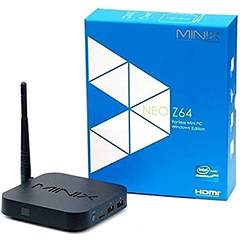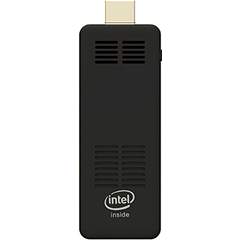Last week I ordered in a couple of the newest miniature computers. This last weekend I took a few hours to put them through their paces. The minix NEO Z64 I knew what to expect from and the newest release of that didn’t disappoint. If you really push it hard, it can overheat (particularly if you put it in an insulated box so it can’t radiate heat while playing video intensive games and simultaneously streaming a movie in 1080p) but under the loads it was built for and out where it can radiate heat, it worked flawlessly. This class of machine represents a great way to turn a TV into an advertising kiosk, a nice internet station and a myriad of applications in between. Its small size, square shape and variety of ports (hdmi, ethernet jack, headphone jack, 2 full size usb ports, sd/mmc reader slot) plus built in wireless n, bluetooth with windows 10 pre-installed on a 28gb ssd and 2gb ram connected to a quad core intel atom cpu (1.33-1.8 ghz) allow it to run most windows programs flawlessly and surprisingly quickly.  Perhaps pushing my luck, I also ordered my second “stick” computer; these self-contained computers, fit easily into a pocket or purse and can be powered off the usb port on a television. The AWOW Intel Atom Z3735f is one of many attempts at evolutionary steps forward from the first 2 generations of pc sticks. This one has an internal fan (very quiet) to deal with complaints of early models overheating, 2 usb ports + 1 usb power port to deal with complaints that all ports are taken after you connect a wireless keyboard and mouse combo and dual band ac networking to remedy a number of issues with the early units and their g or n wireless networking. Also in the packaging came a short HDMI cable (in case you don’t want it physically attached to your TV) and an adapter from micro usb to full size usb. Still included on this model from earlier designs is an MMC card slot for up to 64gb memory modules and bluetooth 4.0.
Perhaps pushing my luck, I also ordered my second “stick” computer; these self-contained computers, fit easily into a pocket or purse and can be powered off the usb port on a television. The AWOW Intel Atom Z3735f is one of many attempts at evolutionary steps forward from the first 2 generations of pc sticks. This one has an internal fan (very quiet) to deal with complaints of early models overheating, 2 usb ports + 1 usb power port to deal with complaints that all ports are taken after you connect a wireless keyboard and mouse combo and dual band ac networking to remedy a number of issues with the early units and their g or n wireless networking. Also in the packaging came a short HDMI cable (in case you don’t want it physically attached to your TV) and an adapter from micro usb to full size usb. Still included on this model from earlier designs is an MMC card slot for up to 64gb memory modules and bluetooth 4.0.
Just think about going to a presentation with a gyro mouse/keyboard combo and this stick in your pocket; any modern tv becomes an instant presentation device with a computer you are familiar with and confident using. Performance is in keeping with its Atom quad core cpu’s capabilities; but when coupled with the 32gb MMC hard drive (solid state), it is surprisingly responsive handling the Microsoft Office 2010 and 2016 apps with ease and all of the web apps I have tried run flawlessly on it. Movies streamed from Netflix and Amazon as well as a variety of shows streamed from Hulu all run in smooth video up to full HD (dependent on your internet speed). Both of these miniature computers are simple representatives of a whole family of new products from a wide range of suppliers. I selected these 2 from the 100 plus choices I found when I started shopping based on my ideas about what I wanted them to do. You may have very different applications for computing power that goes anywhere with you or can be put into a very small niche or used to turn any tv into whatever. There are also many specialty items in the same form factor to provide a wide variety of services; one unit that caught my eye has two digital cable / satellite / over the air tuners in it so that it adds record while viewing a different show ability to a tv, another had multiple ethernet ports and ac wireless built in so it could be a network bridge or switch and access point. As a final thought, imagine that you routinely move between 2 or more “stations” where you use a computer and you have frustrations with using the cloud to keep all of your “stuff” handy. On top of that, who wants to have to configure multiple computers to work the way you find comfortable and have all the tools you want? Instead, you could pop the computer into your pocket and always use the same computer wherever you are working. I know this was the dream of laptop computers, but you can’t just pop a laptop into your pocket and you are constrained to the laptop screen, keyboard and so forth. Keyboards and mice are inexpensive and it would be easy to have your favorite model waiting for you at each station. Walk up, plug in your miniature computer to the tv and turn on the power; in under a minute you are working at your workstation. Enjoy!

